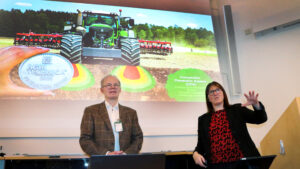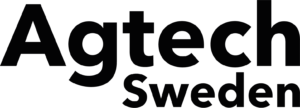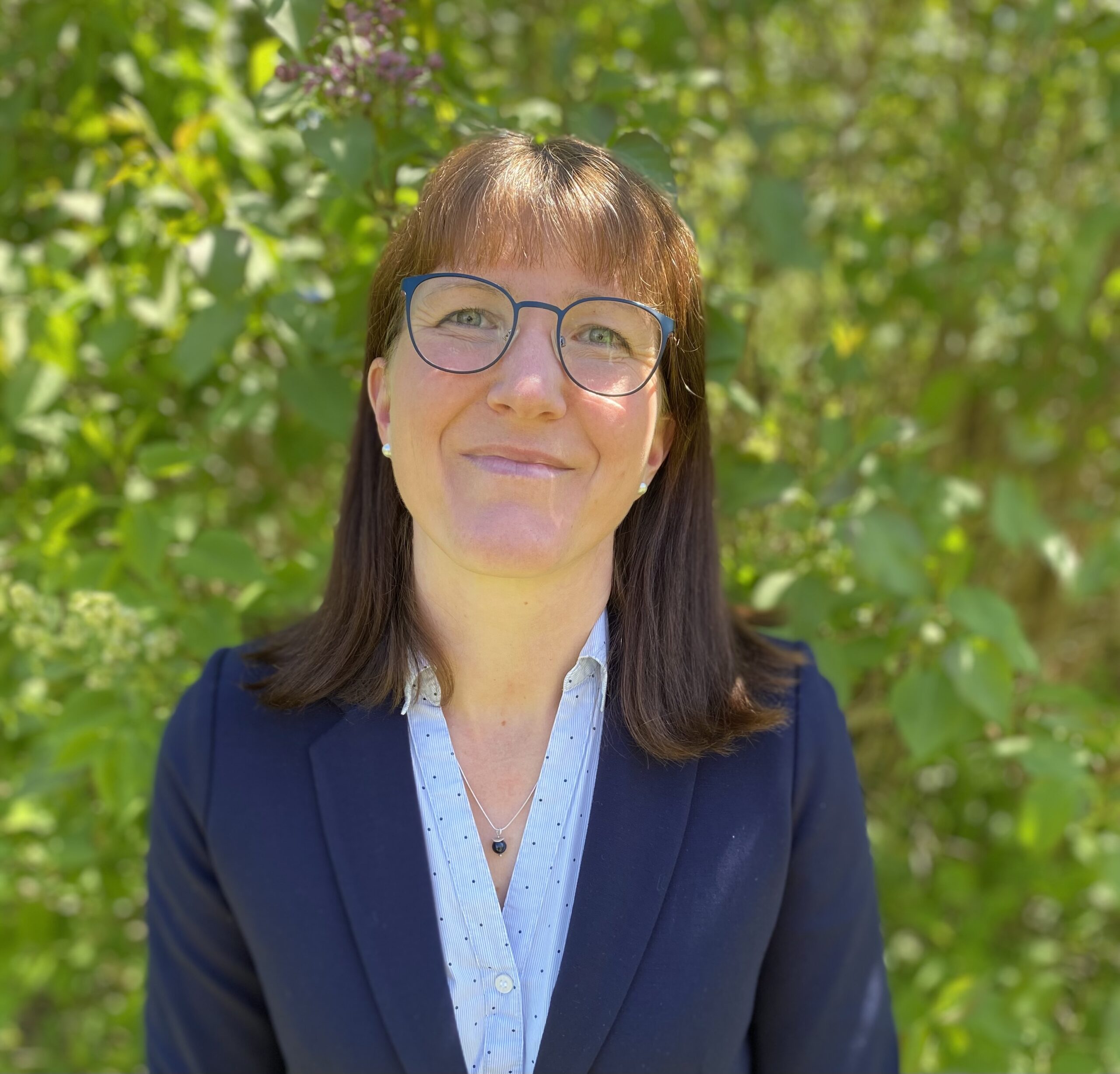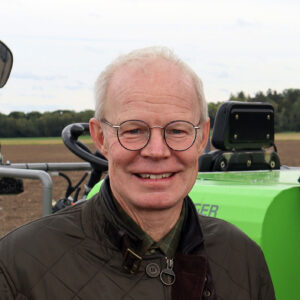18 August 2025
By Ulrik Svedin
Do you have a problem in agriculture that you think could be solved with new technology? Or do you already have the solution? Agtech Sweden at Linköping University can contribute with research-based knowledge, development, and start-up support.

Agtech Sweden is a knowledge center and an innovation platform at Linköping University. The purpose of Agtech Sweden is to develop new technology for sustainable agriculture and to spread knowledge about agricultural technology and innovation.
The focus is on new concepts based on sensors, digital technology, and mechanics, but also on new collaborations and business models.
“We don’t work with just one thing. We are broadly engaged in what might need a solution, or what may be a challenge in agriculture,” says Karolina Muhrman, operations manager at Agtech Sweden.
Agtech Sweden’s main funders are Vinnova, Linköping University, and Region Östergötland. The operation has been running for six years (previously Agtech 2030) and has more than 90 ongoing and completed projects with over 130 contracted partners.
“The partners co-finance the projects we work on. They are contractually involved in the innovation projects,” says Per Frankelius, operations manager at Agtech Sweden.
The organization works with many different projects simultaneously:
“It ranges from developing new robot and drone concepts for crop cultivation, to capturing methane in livestock barns, studying the effects of LED lighting on animals, and even capturing the sounds of plants using AI,” says Karolina.
Here are examples of areas where new technology and innovations are being developed:
-
Climate adaptation such as drought and flooding
-
Weed control
-
Energy
-
Soil health
-
Animal welfare
-
Profitability issues
-
Regulatory challenges
-
Work environment
Agtech Sweden invests heavily in monitoring global developments, gathering knowledge, and sharing insights. Representatives of the organization have on several occasions given talks in the Swedish Parliament and to government ministers. They have also been invited multiple times to conferences organized by the European Commission and by various United Nations bodies to participate in discussions on international agricultural issues.
“We organize numerous seminars to share knowledge about new technology and to gather information about the needs of farmers. We also attend several major agricultural fairs, in Europe and in Sweden. There we make connections and give lectures on trends and new agricultural technologies – and on all the projects we are already involved in,” says Per Frankelius.
How does a project within Agtech Sweden work?
“We put together a team. Someone contacts us with an idea or a problem. We have a network consisting of several thousand actors – for example, tech companies, advisors, researchers, or farmers – who can contribute their expertise,” says Karolina Muhrman.
“We can also provide a small start-up grant, but above all we can contribute knowledge about innovation and help in applying for funding,” adds Per Frankelius.
Agtech Sweden collaborates with many different farms in its innovation projects but has seven contracted so-called innovation farms that are used for various tests and development work – in other words, real farms where new technology is developed together with farmers and advisors.
Collaboration and knowledge sharing
Collaboration
Agtech Sweden at Linköping University collaborates with more than 130 contracted partners.
Some of the partners who have participated in innovation projects include:
Swedish University of Agricultural Sciences (SLU), Lund University, University of Skövde, the Rural Economy and Agricultural Societies, RISE, Linköping Science Park, Visual Sweden, AgroÖst, Vreta Cluster, Vreta Education Center, the Swedish Oilseed and Cereal Growers, Swedish Eggs, Drone Center Sweden, Kverneland, Saab, Väderstad, and Dynorobotics.
Trade Fairs
Agtech Sweden is active at several major agricultural fairs. For example, they are planning a Nordic pavilion with several companies at the world’s largest agricultural fair, Agritechnica in Hannover in the autumn of 2025. During the year, the organization has also participated actively in Swedish fairs in Lidköping, Borgeby, and Brunnby.
At Elmia Agriculture 2024, Agtech Sweden organized an innovation arena that attracted media attention – and was visited by Minister for Rural Affairs, Peter Kullberg.
Seminars
Representatives of Agtech Sweden give lectures about the organization, and they arrange forums and arenas to highlight new projects and some finished products, as well as the companies and organizations that are driving agricultural innovation forward.
International Collaborations
Agtech Sweden collaborates with several agricultural organizations in Europe and worldwide. They have taken part in several international meetings with the European Commission and in various contexts with the United Nations. Among other things, Agtech’s operations managers were invited to the UN Office for Outer Space Affairs (UNOOSA) in Vienna to discuss the use of satellites for agriculture globally.
Projects – some examples
In six years, more than 90 projects have been initiated and completed. Here are a few examples:
Connected Animals
A digital platform focused on connecting sensors to, for example, livestock. The purpose is to know where the animals are located in a pasture. The information from the sensors can help the farmer in several ways.
Soil Compaction
Agricultural machinery is becoming heavier, which causes soil compaction. This hinders important processes that affect crop root development, such as water flow, soil biology, and oxygen availability. Reduced oxygen in the soil leads to nitrous oxide emissions, a greenhouse gas. A team within Agtech 2030 began developing a system that calculates the risk of soil compaction in real time. Through the now-patented Compaction Prevention System, farmers receive support to make decisions directly in the field to avoid soil compaction. For this, the Agtech team won the world’s most prestigious innovation award in agricultural technology: the Agritechnica Innovation Award. The team included Elvestad Södergård, Tolefors Farm, Lovang Agricultural Consulting, and Linköping University, among others.
Cluckbot
Eggs that end up outside the nest are a problem on poultry farms, leading to significant waste. Cluckbot is a robot that, using sound and light, tries to teach hens to lay eggs in the nest. The robot is also equipped with a picker that can collect eggs that still end up outside. The study resulted in a digital prototype describing the concept. Project participants included Dynorobotics, Vreta Education Center, Swedish Eggs, and Tolek AB.
Breathing Sensor
The technology came from Saab, where it was originally used to analyze the health of fighter pilots during flights. The concept was transferred in an experiment to civilian use – on cows. In livestock barns, there is a great need to monitor animal health, and breathing sensors could be one way to achieve this. The trials were conducted, among other places, at Agtech Sweden’s innovation farm at Vreta Education Center.
Sonic Flora
New research shows that plants emit information in the form of ultrasound when they are under stress, such as water scarcity, physical damage, or pest attacks. The discovery, described in a study published in the journal Cell, opens possibilities for monitoring crop health in real time. The aim of the project is to develop a prototype consisting of one or several ultrasound microphones that together can both locate and classify health markers based on plant sounds. To analyze these sound signals in real time and distinguish different stress factors in plants, signal processing and machine learning (AI) are used. The goal is scientific validation that can form the basis for future commercial applications. Project partners include Sonic Flora AB, SLU, and Linköping University.


